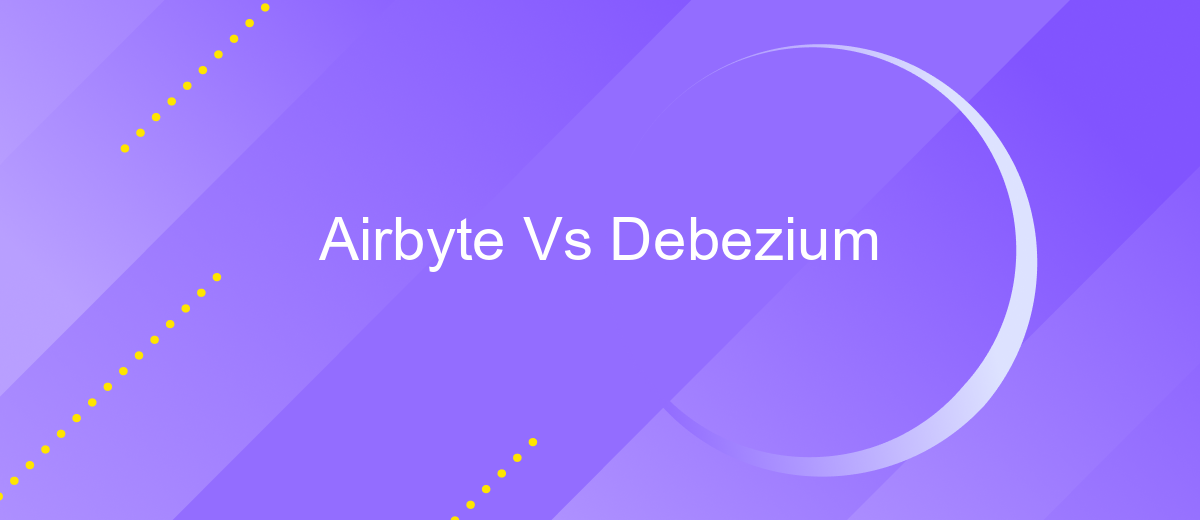Airbyte Vs Debezium
In the rapidly evolving landscape of data integration, choosing the right tool can be critical for success. This article delves into a detailed comparison between Airbyte and Debezium, two powerful platforms designed to streamline data synchronization. By examining their features, performance, and use cases, we aim to provide insights that will help you make an informed decision for your data needs.
Introduction
In today's data-driven world, integrating various data sources efficiently is crucial for businesses. Two popular tools that facilitate data integration are Airbyte and Debezium. Both offer unique features and capabilities, making them suitable for different use cases and requirements.
- Airbyte: An open-source data integration platform that supports a wide range of connectors and destinations.
- Debezium: A distributed platform that captures and streams database changes in real-time.
Choosing the right tool for your data integration needs can be challenging. This article will compare Airbyte and Debezium, highlighting their strengths and weaknesses, to help you make an informed decision. Additionally, we'll explore how services like ApiX-Drive can further streamline the integration process by providing easy-to-use automation solutions.
Overview

Airbyte and Debezium are two prominent tools designed for data integration and real-time data streaming. Airbyte is an open-source data integration platform that allows users to sync data from various sources to their desired destinations. It is highly customizable, supports a wide range of connectors, and is known for its flexibility and scalability. On the other hand, Debezium is an open-source distributed platform for change data capture (CDC). It enables the capturing and streaming of real-time changes from databases, ensuring that data is always up-to-date across different systems.
While both tools serve the purpose of data integration, they cater to different needs and use cases. Airbyte is ideal for organizations looking to integrate data from multiple sources efficiently, whereas Debezium excels in scenarios requiring real-time data synchronization. Additionally, services like ApiX-Drive can further streamline the integration process by offering automated workflows and seamless connectivity between various applications, enhancing the overall efficiency and effectiveness of data management strategies.
Key Features

When comparing Airbyte and Debezium, it is essential to consider their key features to understand which tool best suits your data integration needs. Both platforms offer unique capabilities that cater to different aspects of data synchronization and integration.
- Data Connectors: Airbyte provides a vast array of pre-built connectors for various data sources and destinations, ensuring seamless integration. Debezium, on the other hand, specializes in change data capture (CDC) connectors for databases.
- Real-time Data Sync: Debezium excels in real-time data synchronization by capturing and streaming changes from databases. Airbyte also supports real-time data sync but is more versatile with batch processing options.
- Customization and Extensibility: Airbyte's open-source nature allows for extensive customization and the creation of custom connectors. Debezium, while also open-source, focuses more on database CDC.
- Ease of Use: Airbyte offers a user-friendly interface and straightforward setup process, making it accessible for users with varying technical skills. Debezium requires more technical expertise for configuration and deployment.
For those looking to streamline their integration setup further, services like ApiX-Drive can be incredibly beneficial. ApiX-Drive simplifies the process of connecting various applications and automating data workflows, complementing the capabilities of both Airbyte and Debezium.
Use Cases

Airbyte and Debezium serve different purposes but can often complement each other in various data integration scenarios. Airbyte is a versatile data integration platform that can handle a wide array of data sources and destinations, making it suitable for businesses looking to centralize their data pipelines. Debezium, on the other hand, specializes in change data capture (CDC), enabling real-time data replication from databases.
One common use case for Airbyte is in ETL (Extract, Transform, Load) processes where data from multiple sources needs to be aggregated into a data warehouse or data lake. Debezium is particularly useful for maintaining up-to-date replicas of transactional databases, ensuring data consistency across distributed systems.
- ETL processes for data warehousing
- Real-time data replication for transactional databases
- Data synchronization between microservices
- Ensuring data consistency in distributed systems
For businesses that need to integrate a variety of services and automate data workflows, tools like ApiX-Drive can be invaluable. ApiX-Drive simplifies the setup of integrations, allowing users to connect different applications without extensive coding. By leveraging Airbyte, Debezium, and ApiX-Drive, companies can build robust and efficient data ecosystems tailored to their specific needs.
Comparison
Airbyte and Debezium are both powerful tools for data integration, but they serve different purposes and have unique strengths. Airbyte is an open-source data integration platform that focuses on ease of use and flexibility. It supports a wide range of data sources and destinations, making it ideal for organizations looking to streamline their ETL processes. On the other hand, Debezium is a distributed platform for change data capture (CDC). It is designed to track changes in databases and stream them to various consumers in real-time, which is crucial for maintaining data consistency across systems.
While Airbyte excels in providing a user-friendly interface and broad compatibility with different data services, Debezium shines in its ability to capture and propagate database changes efficiently. For organizations needing a comprehensive ETL solution, Airbyte's extensive connector library and ease of configuration, possibly enhanced with services like ApiX-Drive, are significant advantages. Conversely, for real-time data synchronization and consistency, Debezium's robust CDC capabilities make it the preferred choice. Ultimately, the choice between Airbyte and Debezium depends on the specific data integration needs and the desired outcomes of the organization.
- Automate the work of an online store or landing
- Empower through integration
- Don't spend money on programmers and integrators
- Save time by automating routine tasks
FAQ
What are the primary differences between Airbyte and Debezium?
Which tool is better for real-time data replication?
Can Airbyte and Debezium be used together?
How easy is it to set up and configure Airbyte and Debezium?
Are there services to help automate and integrate these tools?
Apix-Drive is a simple and efficient system connector that will help you automate routine tasks and optimize business processes. You can save time and money, direct these resources to more important purposes. Test ApiX-Drive and make sure that this tool will relieve your employees and after 5 minutes of settings your business will start working faster.


